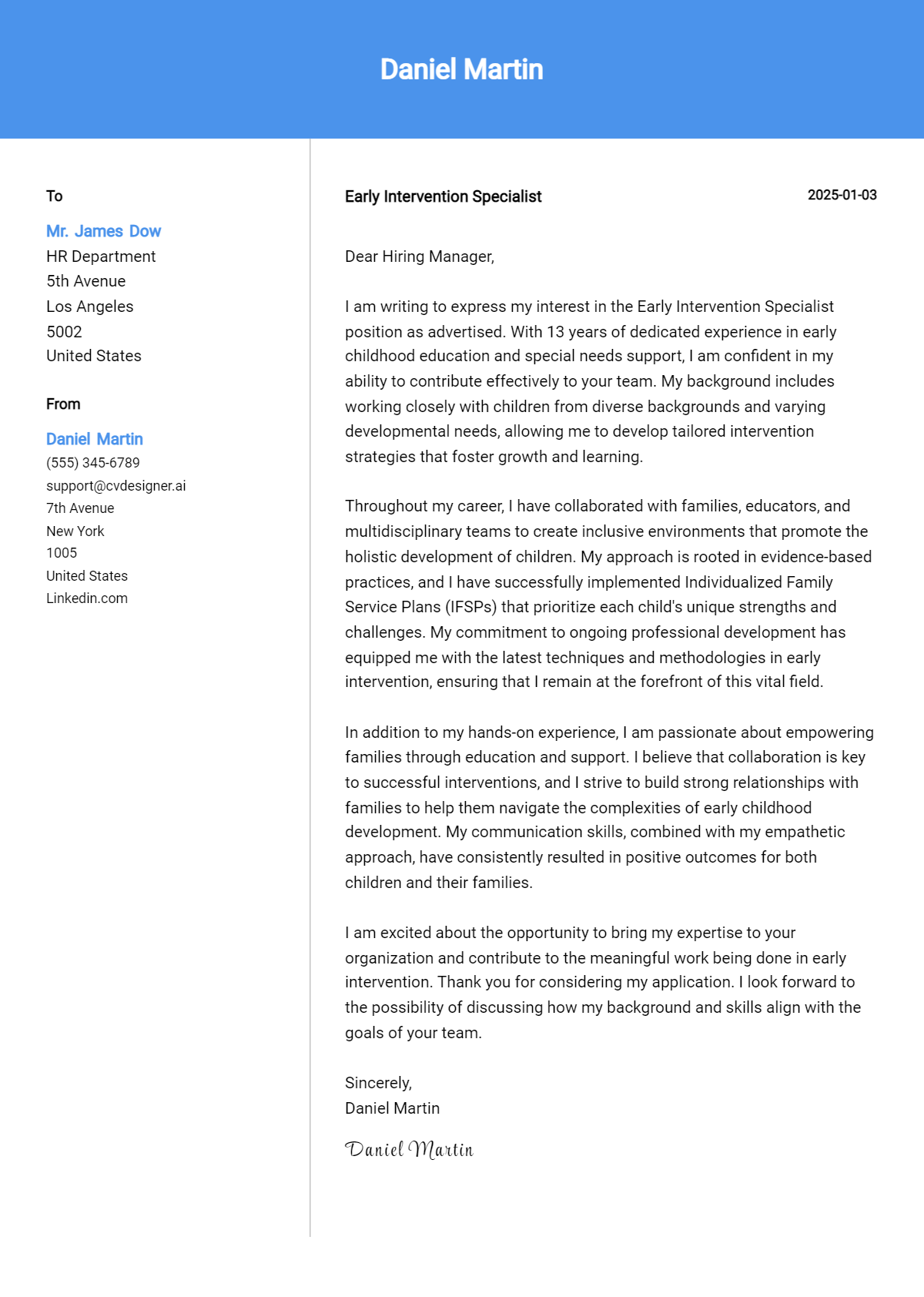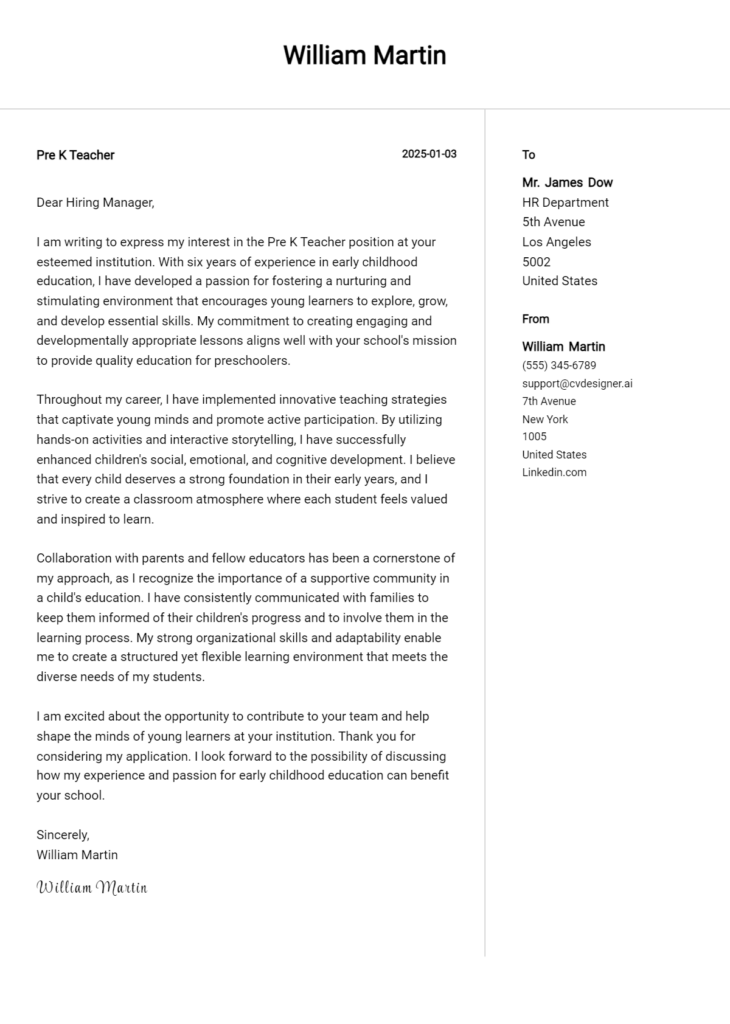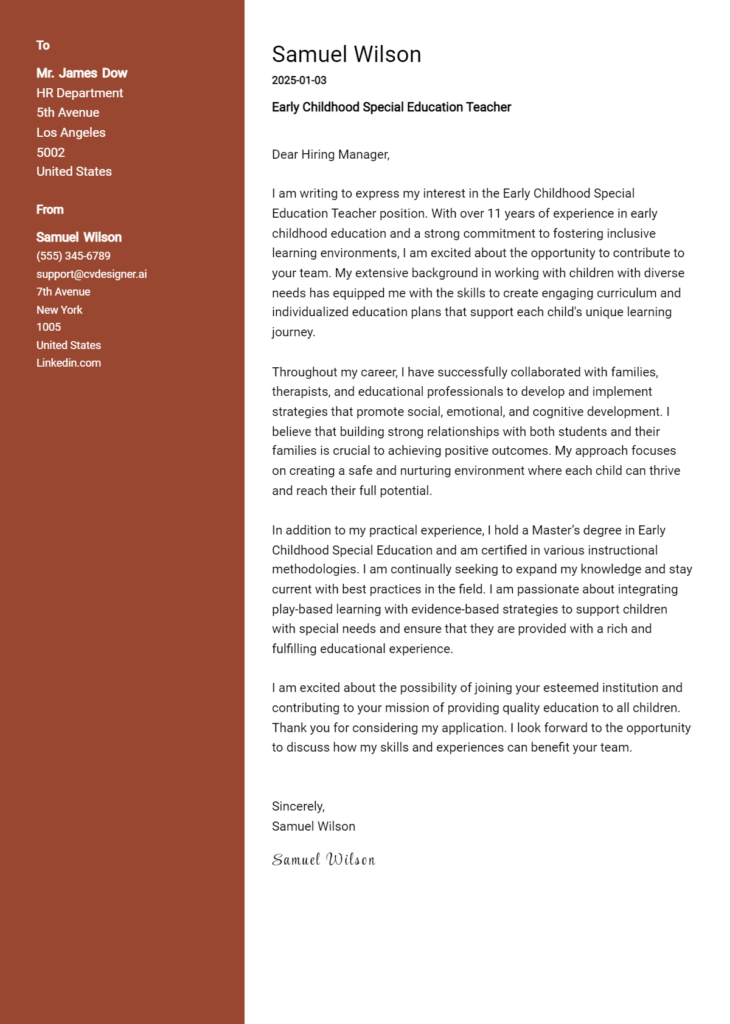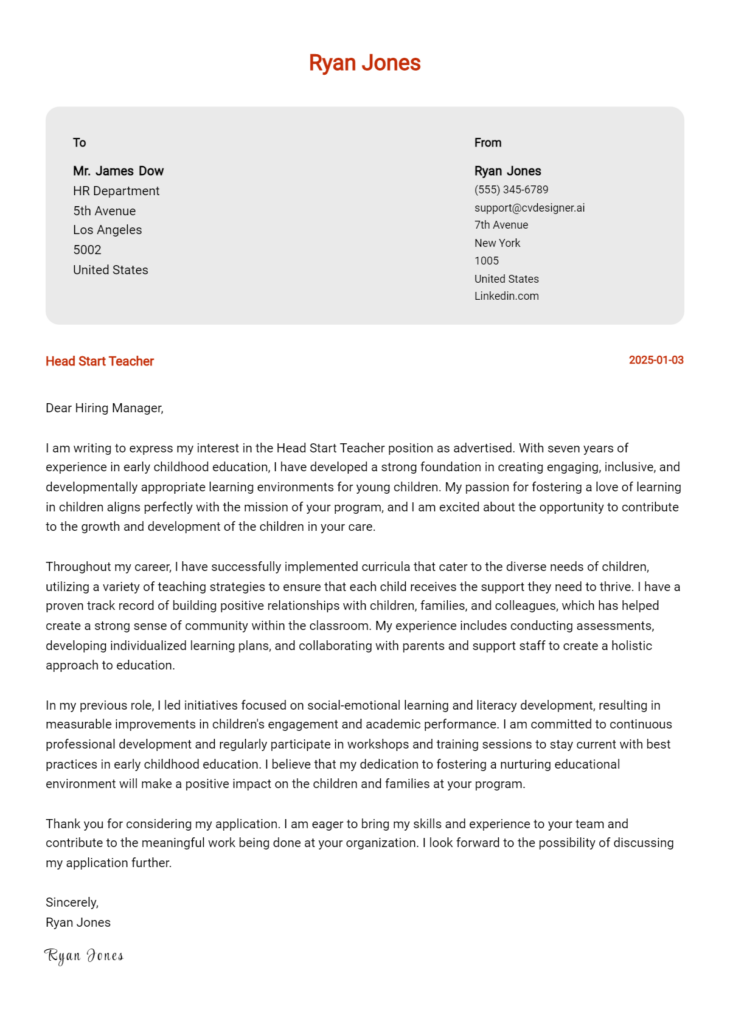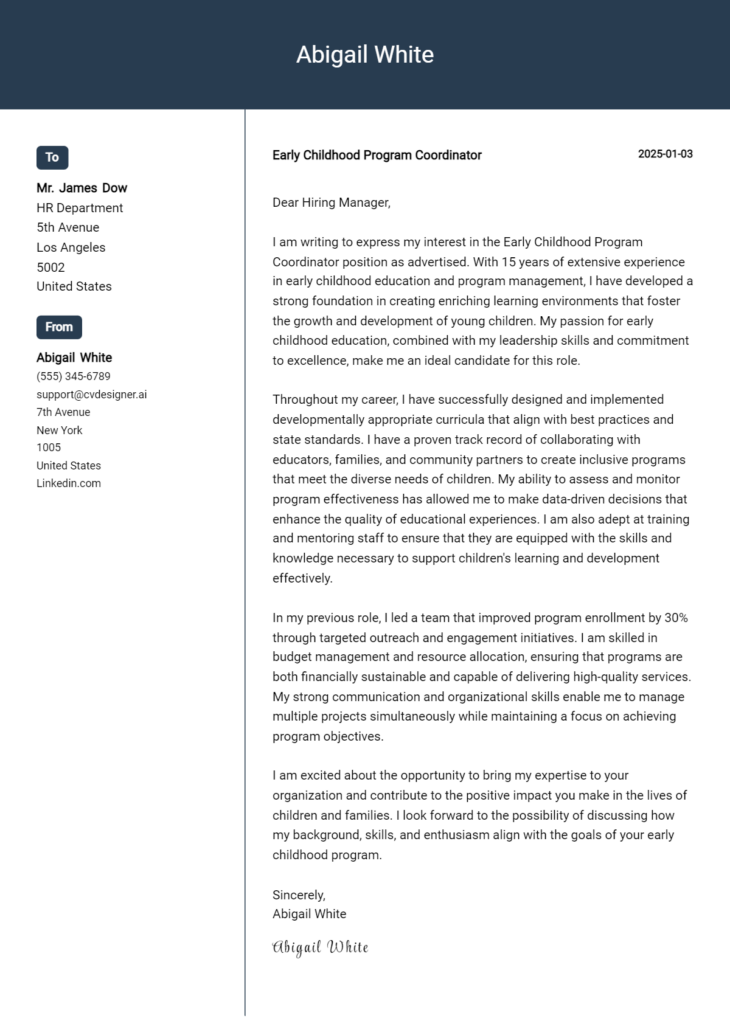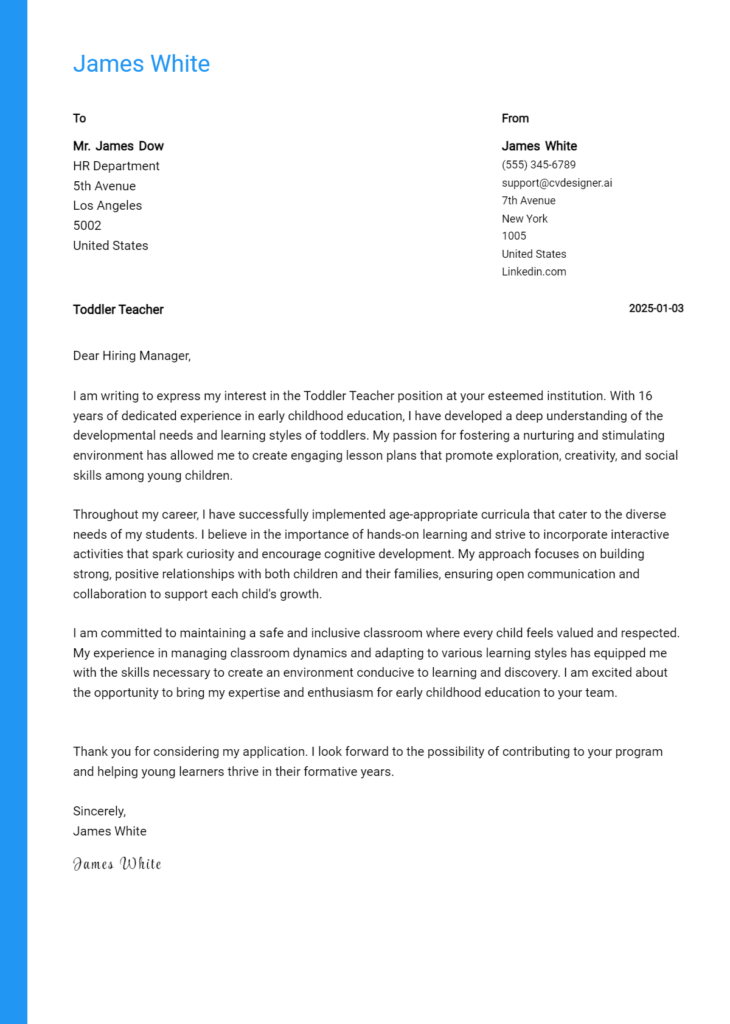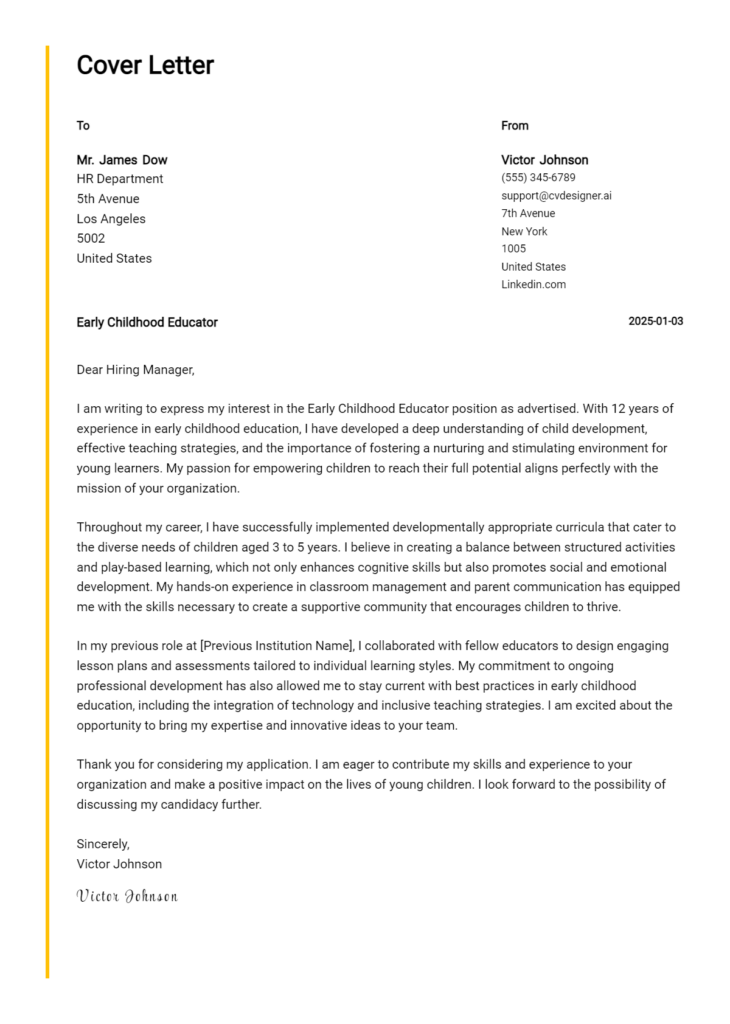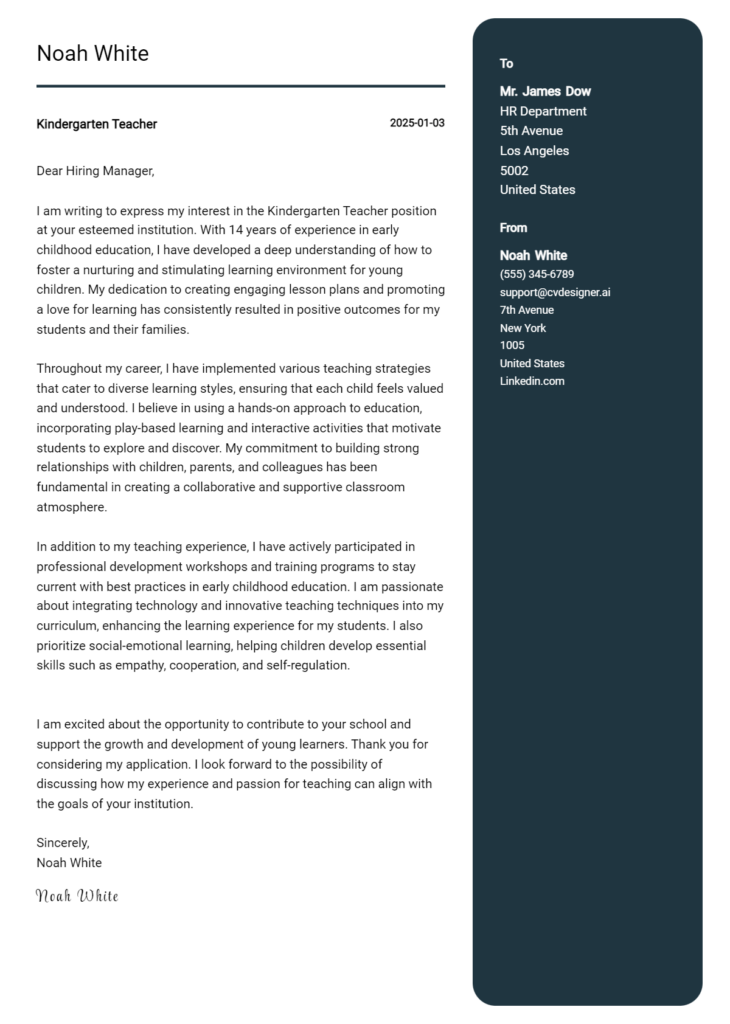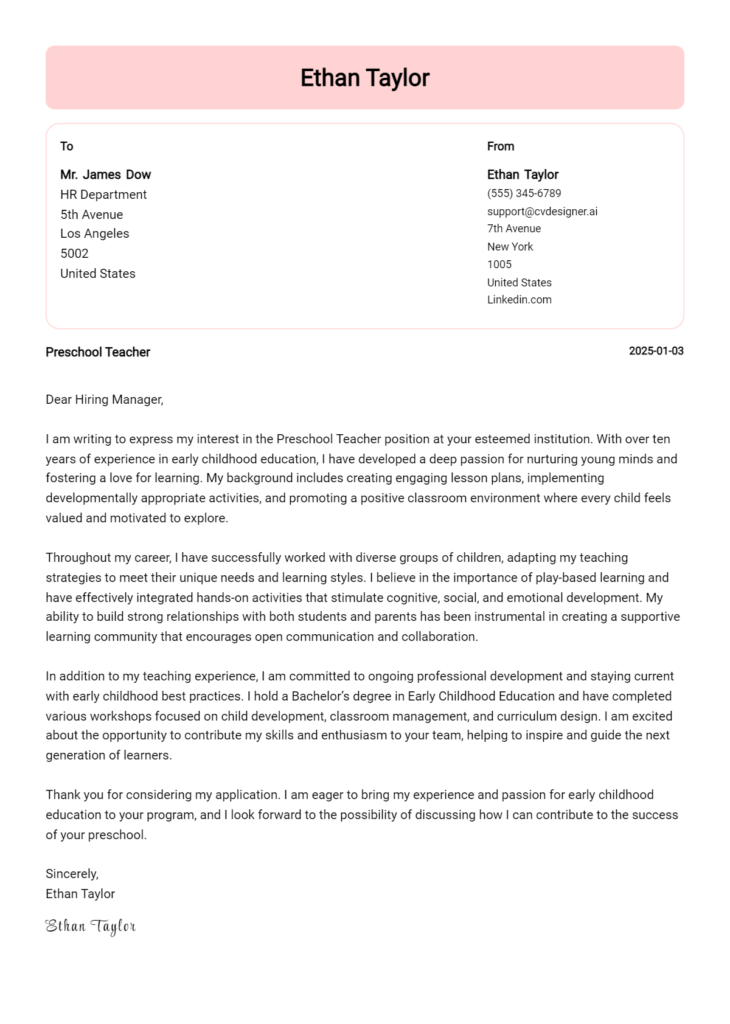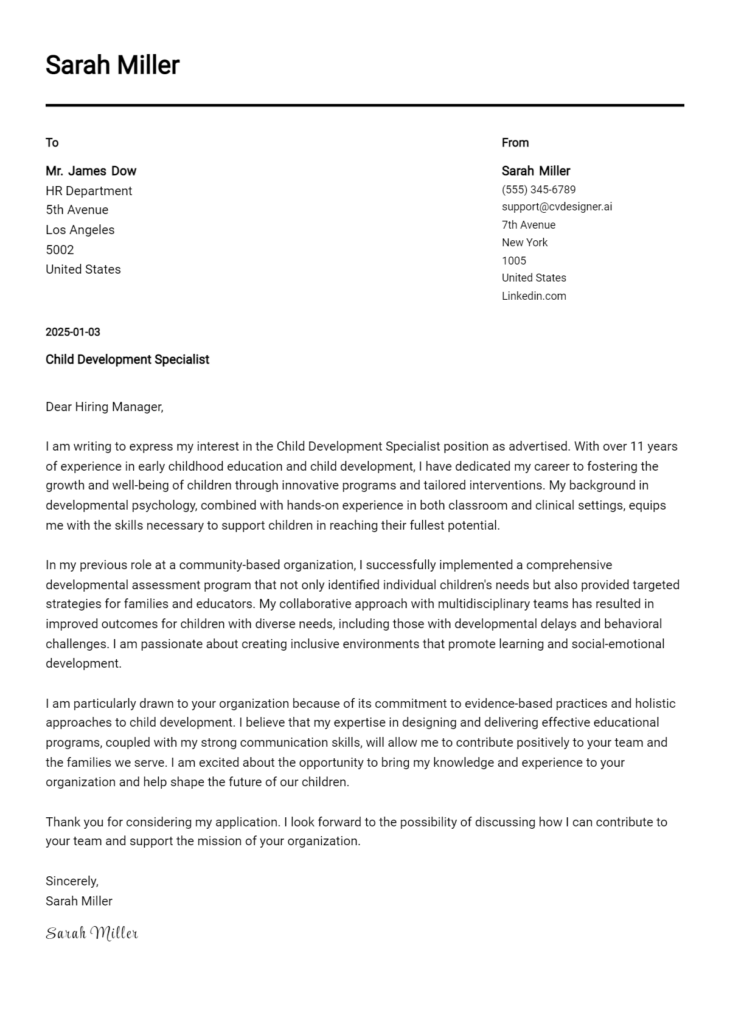Early Intervention Specialist Cover Letter Examples
Explore additional Early Intervention Specialist cover letter samples and guides and see what works for your level of experience or role.
Importance of Cover Letter Formatting for an Early Intervention Specialist
Creating a well-structured cover letter is essential for an Early Intervention Specialist, as it not only conveys your qualifications but also demonstrates your commitment to clear communication and organization—key skills in this field. The way you format your cover letter reflects your ability to connect with families and professionals alike, showcasing your understanding of the importance of early childhood development. A thoughtfully organized cover letter can capture the hiring manager's attention and set you apart from other candidates by highlighting your unique approach to fostering growth in children.
In this guide, we will detail how to effectively structure your cover letter, providing insights and examples tailored for Early Intervention Specialists.
We will focus on the essential components of a professional cover letter, including:
- Cover Letter Header
- Cover Letter Greeting
- Cover Letter Introduction
- Cover Letter Body
- Cover Letter Closing
Each section is crucial in presenting your qualifications and professionalism. Let’s break down each part and explore how to make your cover letter stand out in the field of early intervention.
Importance of the Cover Letter Header for an Early Intervention Specialist
A well-crafted cover letter header is crucial for an Early Intervention Specialist, as it sets the tone for the entire application and demonstrates professionalism. The header should include your contact information, the date, and the recipient's details, ensuring clarity and making it easy for the hiring manager to reach you. A clear and organized header not only reflects your attention to detail but also enhances your credibility as a candidate for a role that requires effective communication and organizational skills.
Strong Example
Jane Doe 1234 Elm Street Springfield, IL 62701 jane.doe@email.com (555) 123-4567 October 1, 2023 Mr. John Smith Hiring Manager ABC Early Intervention Services 5678 Maple Avenue Springfield, IL 62702
Weak Example
jane doe october 1, 2023 abc early intervention services
The Importance of the Cover Letter Greeting for an Early Intervention Specialist
The greeting of a cover letter serves as the first impression and sets the tone for the entire document. A well-crafted greeting not only demonstrates professionalism but also adds a personal touch by addressing the hiring manager directly. This approach shows that you have taken the time to research the organization and its staff, which can help you stand out among other applicants. To avoid generic greetings like "To Whom It May Concern," it's beneficial to look for the recipient's name through the company website, LinkedIn, or by calling the organization's office if necessary. A personalized greeting can make your cover letter more engaging and tailored to the specific role of an Early Intervention Specialist.
Strong Greeting Example
Dear Ms. Johnson,
Weak Greeting Example
To Whom It May Concern,
The Importance of a Captivating Cover Letter Introduction for an Early Intervention Specialist
A well-crafted cover letter introduction is crucial for an Early Intervention Specialist, as it serves as the first impression for potential employers. This opening paragraph should capture the hiring manager's attention, express genuine enthusiasm for the role, and briefly highlight key skills or achievements relevant to early intervention. A strong introduction sets the tone for the rest of the cover letter, showcasing the candidate's passion for helping children and families, as well as their professional qualifications. Conversely, a weak introduction can fail to engage the reader, resulting in the candidate's application being overlooked.
Strong Example
Dear [Hiring Manager's Name], I am excited to apply for the Early Intervention Specialist position at [Company Name], as I am deeply passionate about supporting children with developmental delays and their families. With over five years of experience in early childhood education and a proven track record of implementing successful intervention programs, I am confident in my ability to make a positive impact in your community. My dedication to fostering growth in young children aligns perfectly with your organization's mission, and I am eager to contribute my skills to your team.
Weak Example
To Whom It May Concern, I am applying for the Early Intervention Specialist role. I have some experience working with children, and I think I could do well in this position. I am looking for a job and believe this one could be a good fit for me.
Cover Letter Body for Early Intervention Specialist
The body of a cover letter for an Early Intervention Specialist serves as a critical platform to illuminate the candidate's qualifications, experiences, and unique contributions to the role. It is an opportunity to delve into specific projects or accomplishments that demonstrate the candidate's expertise in supporting children with developmental delays and their families. By highlighting relevant experiences, such as successful implementation of intervention strategies, collaboration with multidisciplinary teams, and positive outcomes achieved, the candidate can effectively convey their value to the organization. This section should seamlessly blend professional achievements with personal passion for early intervention, making a compelling case for why the candidate is the best fit for the role.
Strong Example
I am proud to have successfully implemented a new early literacy program that resulted in a 30% increase in reading proficiency among preschoolers with special needs at my previous job. By collaborating closely with parents and educators, I tailored individualized learning plans that addressed each child's unique challenges. This initiative not only fostered a love for reading but also empowered families to engage in their children's learning journeys. My experience working with a diverse range of children has equipped me with the skills necessary to assess developmental milestones and create targeted interventions that yield measurable results.
Weak Example
I have worked with children for a few years. I think I would be a good fit for this position. I helped some kids with their learning. I enjoy working with families and believe I can help.
Importance of Cover Letter Closing for an Early Intervention Specialist
The closing paragraph of a cover letter is crucial as it encapsulates the candidate's qualifications and reiterates their enthusiasm for the position. For an Early Intervention Specialist, this is an opportunity to highlight relevant experience, express a commitment to supporting children and families, and prompt the hiring manager to take the next step, such as reviewing the resume or scheduling an interview. A strong closing can leave a lasting impression, while a weak one may fail to convey the candidate's passion and readiness for the role.
Strong Example
Thank you for considering my application for the Early Intervention Specialist position. With my extensive experience in implementing individualized support plans and my dedication to fostering positive developmental outcomes for children, I am excited about the opportunity to contribute to your team. I welcome the chance to discuss how my skills align with the needs of your organization and look forward to the possibility of scheduling an interview. Please feel free to contact me at your earliest convenience to arrange a conversation.
Weak Example
I hope you like my application for the Early Intervention Specialist job. I think I would be a good fit. Please look at my resume. Thanks.
These tips will assist candidates in creating a compelling cover letter for the position of an Early Intervention Specialist. A well-crafted cover letter not only highlights your technical skills and problem-solving abilities but also demonstrates your knowledge of the Software Development Life Cycle (SDLC), your capacity for teamwork, and your passion for continuous learning. By effectively showcasing these attributes, you can make a strong impression on potential employers.
Tips for Writing an Effective Cover Letter for Early Intervention Specialist
Highlight Relevant Technical Skills
Clearly outline the technical skills that are pertinent to the role, such as familiarity with developmental assessments, intervention strategies, and data analysis tools. Use specific examples to illustrate how you have utilized these skills in previous positions. This will give hiring managers a clear understanding of your qualifications.Demonstrate Problem-Solving Abilities
Share examples of challenges you have faced in your previous roles and detail how you successfully navigated them. This could involve innovative approaches to intervention or collaboration with families and other professionals. Emphasizing your problem-solving skills will showcase your ability to adapt and find effective solutions in dynamic environments.Showcase SDLC Knowledge
If applicable, mention your understanding of the Software Development Life Cycle as it relates to data management and reporting in early intervention programs. Discuss any experience you have in implementing or utilizing software tools that support SDLC phases in your work. This knowledge can set you apart as a candidate who is not only skilled in intervention but also in the operational aspects of the role.Emphasize Teamwork and Collaboration
Early intervention specialists often work as part of a multidisciplinary team. Highlight your experience in collaborating with other professionals, such as educators, therapists, and families. Provide specific examples of how your teamwork has led to successful outcomes for children, demonstrating your ability to engage and communicate effectively with diverse stakeholders.Express a Passion for Continuous Learning
In a field that is constantly evolving, showing a commitment to professional development is crucial. Mention any relevant certifications, workshops, or courses you have completed, as well as your willingness to learn and adapt to new methods and theories. This not only reflects your dedication but also indicates that you are proactive about enhancing your skills for the benefit of the children you serve.
For additional support in crafting your cover letter, consider exploring cover letter templates and utilizing a cover letter builder to streamline the process and ensure your application stands out.
Common Mistakes to Avoid in a Early Intervention Specialist Cover Letter
Crafting a compelling cover letter is crucial for securing a position as an Early Intervention Specialist. Avoiding common mistakes can significantly enhance your chances of making a positive impression. Here are some pitfalls to watch out for, along with tips to steer clear of them:
Generic Greetings: Starting your letter with a generic greeting like "To Whom It May Concern" can make you seem disinterested. Instead, research the hiring manager's name and address them directly.
Rehashing Your Resume: Simply repeating what's on your resume can bore the reader. Use your cover letter to highlight key experiences and explain how they relate to the role.
Ignoring the Job Description: Failing to tailor your cover letter to the specific job description can lead to a missed opportunity. Reference the skills and qualifications listed in the job posting and demonstrate how you meet them.
Lack of Specific Examples: Vague statements about your skills or experience can detract from your message. Include specific examples that showcase your accomplishments and how they would benefit the employer.
Poor Formatting: A cluttered or unprofessional format can detract from your message. Follow a clear cover letter format to ensure your letter is easy to read and visually appealing.
Typos and Grammatical Errors: Mistakes in spelling or grammar can undermine your professionalism. Always proofread your letter multiple times and consider having someone else review it as well.
Missing a Call to Action: Failing to include a call to action can leave your letter feeling incomplete. Close with an invitation for further discussion, expressing your enthusiasm for the opportunity.
By steering clear of these common pitfalls, you can create a standout cover letter that effectively conveys your qualifications and passion for the role. For inspiration, check out these cover letter examples to guide your writing.
Cover Letter FAQs for Early Intervention Specialist
What should I include in my cover letter as an Early Intervention Specialist?
In your cover letter, focus on your relevant education, experience, and passion for supporting children with developmental delays. Highlight your qualifications, such as a degree in special education or child development, and any certifications like the Child Development Associate (CDA) or specific training in early intervention strategies. Mention any hands-on experience you have with children, including assessments, individualized education plans (IEPs), and family collaboration. Additionally, showcase your understanding of child development theories and your ability to work with families to promote their child’s growth. Personal anecdotes or case studies can illustrate your effectiveness in this role.
How do I tailor my cover letter for a specific job application?
To tailor your cover letter for a specific Early Intervention Specialist position, start by carefully reading the job description. Identify key qualifications, responsibilities, and skills that the employer emphasizes. Then, match those requirements with your own experiences and strengths. Use specific examples that demonstrate how you have successfully applied these skills in previous roles. Additionally, research the organization’s mission and values to reflect their language and goals in your cover letter, showing that you align with their vision. This personalized approach will help you stand out as a candidate who is genuinely interested in the position.
What tone should I use in my cover letter?
Your cover letter should maintain a professional yet warm tone, reflecting your empathetic nature as an Early Intervention Specialist. Use clear and concise language to convey your qualifications and enthusiasm for the role. While professionalism is crucial, don’t hesitate to infuse some personality into your writing. Use a conversational style that showcases your passion for working with children and families, which is essential in this field. Remember to remain respectful and courteous, as this will set a positive tone for your application and demonstrate your interpersonal skills, which are vital in early intervention settings.
How long should my cover letter be?
Your cover letter should ideally be one page long, comprising three to four paragraphs. Aim for around 250-400 words to ensure you convey your qualifications without overwhelming the reader. Start with an engaging introduction that captures the hiring manager's attention, followed by a body that details your relevant experience and skills. Conclude with a strong closing statement expressing your enthusiasm for the position and a call to action, such as requesting an interview. Keeping it concise ensures that you respect the reader's time while providing enough information to demonstrate your suitability for the Early Intervention Specialist role.
Build your Cover Letter in minutes
Use an AI-powered cover letter builder and have your letter done in 5 minutes. Just select your template and our software will guide you through the process.

